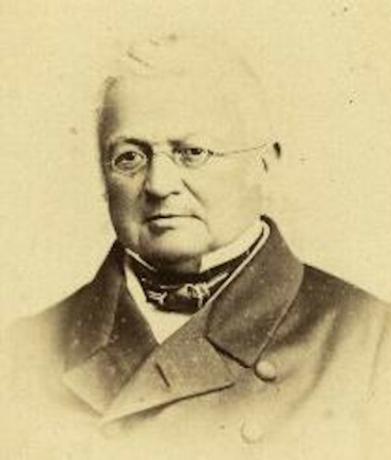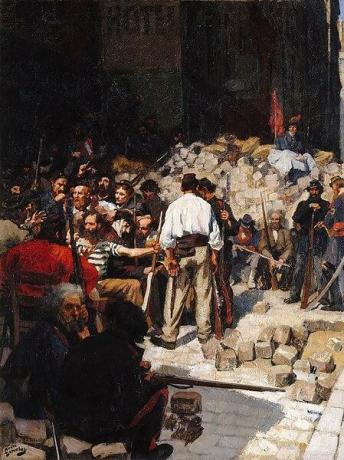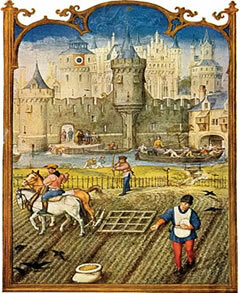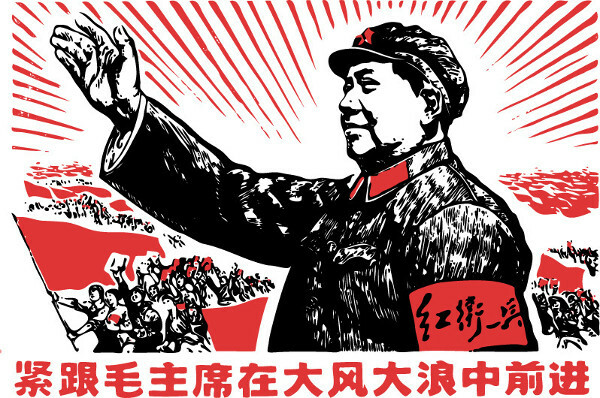THE Paris Communewas the first popular government in history, formed mainly by workers. THE defeat of the french for the Prussians and the imprisonment of Emperor Napoleon III made room for the formation of the Second Republic in France. In 1871, a provisional government was organized that sought to appease the tempers after the war by proposing a rapprochement with Prussia.
The population did not approve, as they wanted retaliation. With the support of the National Guard, the workers revolted and seized power in Paris, forcing the Provisional Government to settle in Versailles. The members of the commune were chosen by universal suffrage and tried to carry out reforms in order to reduce social inequalities.
In May 1871, troops loyal to the provisional government invaded Paris and overthrew the commune. The confrontation between these two forces left thousands dead. Workers' movements in other countries saw the Paris Commune as a model and a real possibility of conquering the power.
Historical context of the Paris Commune
In mid 19th century, Europe was going through a turbulent period, marked by wars and by the discussion about society and its inequalities. O end of the Napoleonic Era and the changes brought about by industrial expansion provoked significant changes in the European political and social scenario. Furthermore, ideologies such as socialism and the anarchism, which questioned the current social model, gained strength and motivated popular movements that sought to form governments that would enable greater popular participation in political decisions.
THE second phase of the industrial revolution promoted to expansion of capitalism by Europe. Industrialization, which began in England in the mid-eighteenth century, took over the entire continent. Significant changes are noted in this period, such as the growth of cities and the formation of a social class who worked in industries, the workers.
Industrialization has deepened the social inequality. The workers who worked in the factories, facing a long working day and without the conditions to do so, did not receive a salary that was compatible with the effort employed. The precariousness of the working class motivated criticism to industrialists and government officials.
The first ideologues of socialism, like Saint-Simon and Robert Owen, believed that the transformation of this degrading and unequal reality in Europe would only happen through the elimination of individualism and private property. This transformation would come peacefully, without the use of force or violence.
It was for the publication of the communist manifesto, in 1848, written by Karl Marx and FriEdricH Engels, that the socialist movement gained strength, leaving the theoretical (or utopian) field and enabling its practice in reality. Marxism stated that social change was in the class struggle, that the worker, in order to overcome the misery in which he lived, should recognize their social condition, join forces with other workers and act in the confrontation against the bourgeoisie, the factory owners. From then on, the Marxism it would become predominant in social struggles, as happened in the Paris Commune in 1871.
See too: Historical materialism – theory created by Karl Marx and Friedrich Engels
What motivated the creation of the Paris Commune?

THE French defeat for Prussia in the war of 1870 and the imprisonment of emperor Napoleon III they provoked popular demonstrations in the streets of Paris, demanding from the government strong measures to fight back the attack coming from the Prussians.
With the emperor imprisoned, the French formed a provisional government after the proclamation of the Second Republic. Adolphe Thiers, representative of bourgeoisie, led the new French government and proposed a peace agreement with Prussia.
The population did not agree and rebelled against Thiers setting up barricades in the streets. With no support in Paris, the Provisional Government moved its headquarters to Versailles.
Do not stop now... There's more after the advertising ;)
Take of Paris and start of the Paris Commune
Paris was in the hands of the poorest population, the workers, who organized a popular government called the Paris Commune. This government was based on the Jacobin experience of the French Revolution, and its members were chosen by universal suffrage. The Council of the Commune established a reform program which had as items:
- free and compulsory education;
- the right to the appropriation of factories by the workers;
- postponement of the deadline for payment of rents for people with financial difficulties.
The commune represented an attempt to form a government that values social equality.
While at Versailles, seat of the provisional government, Thiers received support from the Prussians and invaded Paris to overthrow the commune and restore the provisional government in the capital.
Read too: Forms of government - how government powers are organized and applied

bloody week
In May 1871, Thiers' army attacked Paris. The Commune Council was not prepared to react to the attack and its members were massacred. It is estimated that more than 20 thousand people were killed and 15 thousand were arrested in this confrontation.

Consequences of the Paris Commune
The workers' movement around the world saw the Paris Commune as reference and a real possibility of reaching power. Also, in the field ideological, the Marxist thesis of the class struggle was reinforced, that workers will only be able to free themselves from bourgeois exploitation by confronting those in power.
Summary
- The Paris Commune was the first popular government in history. Its members were chosen by universal suffrage.
- The cause of the commune was the decision of the head of the provisional government, Adolphe Thiers, not to react to the French defeat in the war against the Prussians.
- With the formation of the commune, the Provisional Government installed its headquarters in Versailles.
- The commune was defeated by the government after bloody battles in the streets of Paris.
solved exercises
Question 1 - Tick the alternative that correctly points to the cause of the Paris Commune:
a) Formation of a bourgeois government.
b) Decision of the Provisional Government not to react to the French defeat in the war against Prussia.
c) Attempt by the Provisional Government to install a dictatorship of the proletariat in Paris.
d) Napoleon III's repression of popular demonstrations.
Resolution
Alternative B. The population expected the provisional government to react to France's defeat in the war against Prussia. Adolphe Thiers, leader of the new government, opted for a rapprochement with the Prussians, which provoked a popular uprising.
Question 2 - (Mackenzie) “On March 18, the insurrection broke out (...), I no longer expected to show signs of life. For two months I lived in the furnace (...)” (Émile Zola - letter to Paul Cézanne)
"It was the first proletarian revolution, the first rehearsal of the dictatorship of the proletariat." (Horácio Gonzales)
The nineteenth century event to which the quotes refer is:
a) the 18th Brumaire of Luís Bonaparte
b) the French Revolution
c) the General Rehearsal
d) the Paris Commune
e) the Revolution of 1848
Resolution
Alternative D. The Paris Commune was the first popular government in history. Their proposals were consistent with those of the labor movement, such as factories being run by the workers themselves.
By Carlos Cesar Higa
History teacher


